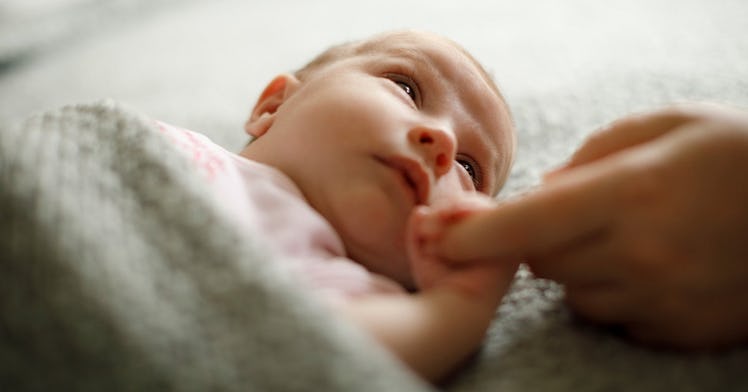Parents of Newborns Can Get $5,000 From the Government This Year. Here’s How
Just had a baby? Don't forget about the stimulus dependent check and the child tax credit payments, which you qualify for.

If you just had a baby this year — and haven’t yet updated your information with the IRS — then your time is running ou to qualify for two cash benefits programs: a single $1,400 stimulus check for your baby (or any new dependent, AKA an infant newborn), and the 2021 child tax credit program for parents, a program that basically amounts to hundreds of dollars in free cash for American parents monthly and a lump sum of cash at tax return time.
If you’re unaware of if you qualify for either of these benefits — the single $1,400 stimulus for dependents or the $3,600 total, per kid, in child tax credit cash payments, here’s what you need to know — and need to do — before the end of the year or by tax filing time, per experts.
Do You Qualify For A Stimulus Dependent Check?
The American Rescue Plan passed under the Biden administration also legislated the third round of stimulus checks — some $1,400 for every adult making less than $75,000 as a single-filer, or $150,000 as a joint-filer. That package also enacted $1,400 stimulus checks for dependents.
Now, if you didn’t have a dependent in March — or added another dependent to your crew of babies — you can still qualify for that $1,400 stimulus. But the “how” of the matter is a little different than how the previously distributed stimulus checks were doled out.
How do you file for the stimulus-dependent check?
You don’t exactly file or contact the IRS about a change in status. Instead, when you file taxes for 2021 (in just a few short months) you can let the IRS know via your tax return you have a new dependent and you will get a $1,400 “tax cut” from the IRS. If you do not usually file taxes, you should still do so in 2021 in order to receive your tax credit — and the second half of your child tax credit payment cash, if you qualify.
Do You Qualify For The Child Tax Credit?
The expanded and enhanced Child Tax Credit payment program is a beefed-up tax credit designed to support lower and middle-class families. The 2021 child tax credit, legislated in March, has been given out to parents in two steps: monthly cash payments to the tune of a few hundred dollars a month per kid, and a lump sum credit at tax time. The total, fully refundable cash credit amounts to $3,600 per kid. If you had a baby in 2021, you qualify for that full $3,600, depending on how much you make.
Joint filers making up to $150,000, heads of household who make $112,500, or single-filers or couples filing separate returns making $75,000, all qualify for the full benefit. After that point, the benefit begins to diminish.
So, if you had a baby, or another baby, in 2021, you qualify for more cash if you haven’t already let the IRS know you had a kid.
If so, how do you sign up for the child tax credit?
If you had a kid recently — or will before the end of 2021 — make sure you sign up at GetCTC.org. There, you can check to see if you’re enrolled in advanced payments for the Child Tax Credit (that monthly cash benefit discussed earlier.) You may want to unenroll in advanced payments since there are only two more payments coming — one on November 15, 2021, and one on December 15, 2021, before the rest is paid out via your tax return.
You have until November 15th to sign up for your enhanced child tax credit payments for 2021, or you can claim the full benefit when you file your 2021 taxes.
There, you can also update your bank account and mailing address, update your income if it changed, review your payments, and update the IRS on your dependent status.
If you didn’t file taxes in 2019, and therefore the IRS doesn’t have the information on the number of dependents you have, you can go to the non-filers tool.
For the record, the social safety net spending legislation Democrats are still, somehow, debating, still includes the enhanced and fully refundable Child Tax Credit, and extends it for one year. So if your baby comes on January 1st, 2022, don’t worry — if that bill passes, you’ll still get the money you deserve.